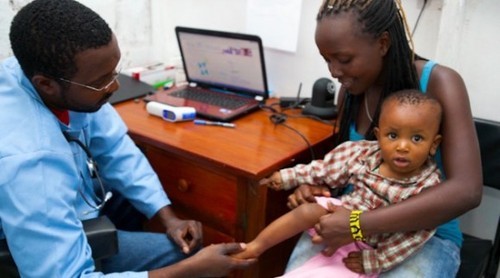Melissa Menke of Access Afya interviewed by Madeline Parish on June 14, 2013.
Access Afya is a finalist for the William James Foundation 2013 Business Plan Competition in the Venture Phase Category . Based in Nairobi Kenya, Access Afya is bringing quality affordable healthcare to the residents of the Mukuru slum through their clinic. Melissa Menke, Access Afya’s founder, is extremely passionate about Access Afya’s ability to promote systemic change and healthy lifestyles in the Nairobi area and beyond.
Is Access Afya in business?
We are up and running. The first Access Afya clinic opened December 2012. Since opening our doors we’ve seen almost 500 patients, and this number has been growing steadily each month.
How many people do you employ?
There are five full-time staff including myself. We also have four Kenyan interns.
Where are you located?
We are located in Nairobi Kenya.
Who are your customers?
Our customers are residents of the Mukuru slums in Nairobi. This market does not currently have access to reliable and safe health care services, medication, and wellness products.
What are you annual Revenues?
The pilot clinic generated approximately $1,400 in revenue between December 2012- April 2013.
What problem are you trying to solve?
There are no quality, private healthcare providers serving the bottom of the pyramid in Nairobi. The government is there, but their facilities are overburdened, crowded, and frequently run out of medication and supplies. Informal chemists sell medication in the slums, but are more focused on sales than wellness. They also have weak supply chains because they buy from smaller, less reliable distributors. There result of this inequity in access to care is higher rates of infectious disease, maternal mortality, and under five mortality for poor populations.
Access Afya provides a safe, reliable alternative to this system. We empower people to make healthy life choices, care for their families, and take ownership of their health.

How did you become interested in that problem?
I am fascinated by idea of systematic change and the opportunity to bring my background in economic development and financial analysis to the social business realm is exciting. The approach of creating something standardized and scalable is also an intellectual challenge that’s fun for me. We aren’t trying to create one clinic- the goal is to create a chain of clinics spreading throughout Kenya and beyond. I enjoy the challenge of creating effective behavioral change marketing, combining education, incentives, and sales.
What is your solution to the problem?
The solution is to get health care to be quick, close, convenient and reliable. If we don’t get those things than people won’t see the benefit and aren’t going to respond and make the changes necessary for us to be successful. Access Afya hopes to do this and provide a trusted private chain of care for our patients.
How has the William James Foundation competition and mentoring program helped you?
My time with the William James Foundation helped me become more articulate. The feedback I received on the business plan was incredibly beneficial in learning how to communicate how Access Afya works within the entire health system. It was also beneficial to receive the feedback from people with diverse backgrounds. There were points about the plan that every judge would agree one and then others that every judge would mention with a different opinion. Having people who are incredibly knowledgeable about their different fields reading the plan gave us great feedback and opportunity for reflection.
I have emailed my judges, and scheduled follow-up conversations with a few of them. Their advice, excitement, and networks have already been useful and I know I will be able to continue to draw on them for brainstorming or introductions.
Anything else you would like the William James Foundation community to know?
We are hoping to break ground on our second clinic in August 2013 and are always open to talking with people who have advice on scaling our idea.
By Madeline Parrish, Communications Intern